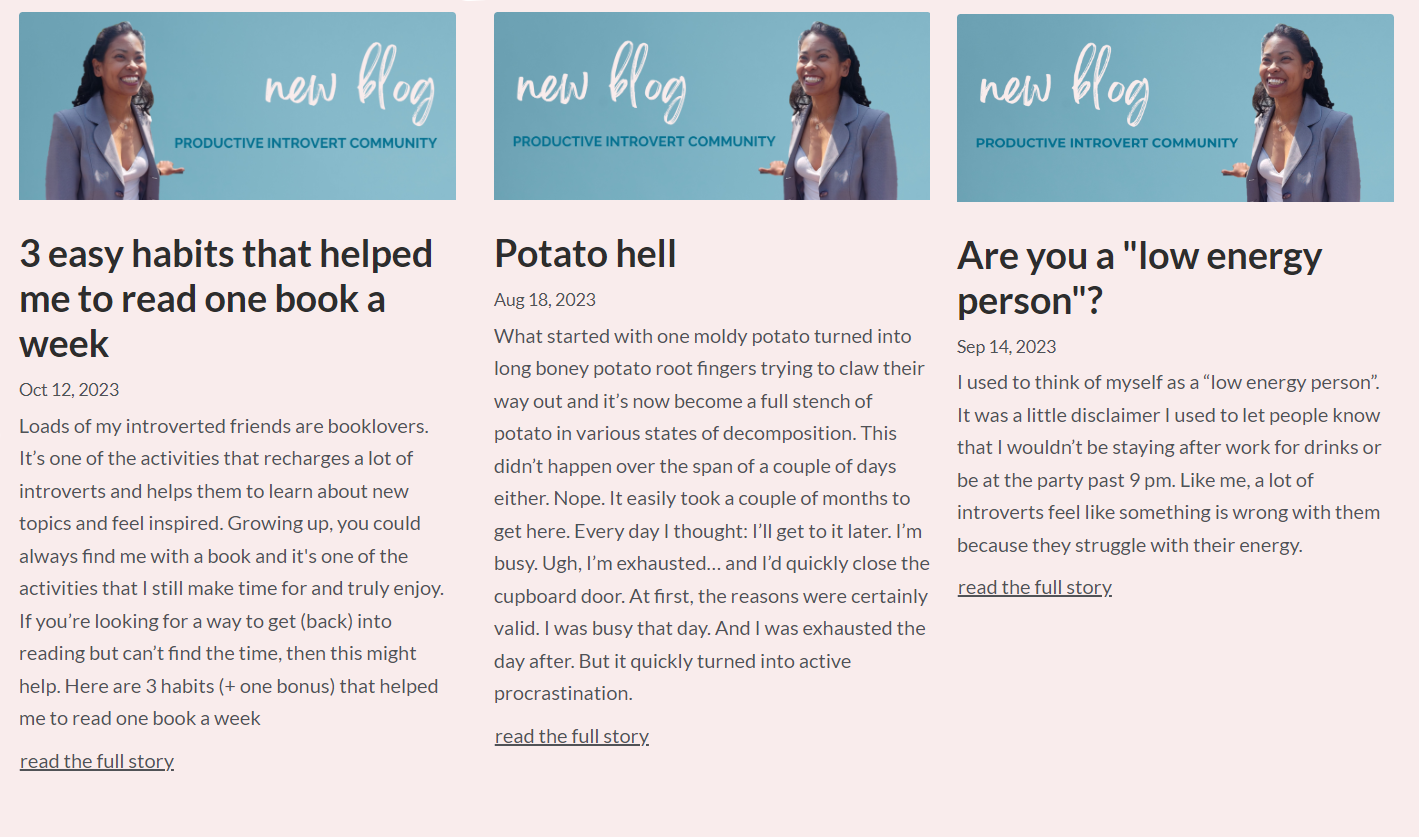-
1. Why do we get stuck in a bad habit?
-
2. An introvert's battery drains during the day
-
3. Changing patterns of behavior
-
4. What makes a habit good or bad?
-
5. Make your nervous system your ally
-
Although these ideas are simple, they're not always easy to implement
-
Read more
-
About the author
-
References
What makes a habit good or bad?

It can be really frustrating when you’re trying to get rid of a bad habit but you just can’t seem to shake it. It’s really normal to feel frustrated or guilty because it’s really hard to break a 'bad habit’.
But... what makes a habit good or bad?
Today, we’re exploring good and bad habits from the brain's perspective.
Highlights
Full Summary
Why do we get stuck in a bad habit?
If I asked you to share a bad habit that you want to stop, I’m pretty sure that you can come up with one or two examples. Something that I’m working on right now is to stop working from the couch with my laptop. I work from home and I like to change up my working space from time to time. Sometimes I end up on the couch but my posture isn’t the best for my back (it’s all ‘down hill’ after 30 they say 😆). Working on my laptop from the couch is something that you could consider a bad habit of mine.
The obvious solution is: Stop working on my laptop from the couch. Right…? Yes. But something can be obvious and still hard to do.
A habit - good or bad - helps your brain to conserve energy (the brain uses 20% of your body’s energy resources while in rest 📖1-2. Any energy saving goes a long way for the brain!
From the brain’s perspective, there really are no good or bad habits. Any habit is good because it saves energy.
An introverts battery drains during the day
You’ve probably heard that introverts lose energy when interacting with others while extroverts gain energy.
There is more to this: your energy levels can depend on who you’re interacting with and - even if you’re working by yourself - certain activities can be more draining than others. There are also more differences between introverts and extroverts e.g. in their natural communication style and how they naturally process information.
But, in general, most introverts loose energy after social interaction while most extroverts gain energy.
You can think of this as a battery. We each start the day with a certain amount of energy in our battery. Even if you’ve had a good night’s sleep and you start off the day with a fully charged battery, most introvert’s batteries will get emptier and emptier as the day goes on. At the end of the day, their batteries are completely empty and they usually need quiet activities or to be by themselves to recharge.
An extrovert’s battery gets charged while they’re with other people. Even if they start with an empty battery at the beginning of the day, they can end up with a full battery after having been out and around people all day.
Changing patterns of behavior
A habit is simply a small pattern of behavior that over time becomes something you don’t think about. Do you brush your teeth after getting out of bed? That’s a habit. Do you like to put milk in your tea? That’s also a habit.
Remember: Learning a habit is changing the patterns between your brain and your body - Taro Iwamoto
The brain is naturally resistant to change in this way, even if you know on a conscious level that making the change would be good for you.
It can be really frustrating when you’re trying to get rid of a bad habit but you just can’t seem to shake it. It’s really normal to feel frustrated or guilty because it’s really hard to break a 'bad habit’.
Changing the patterns between the brain and the body takes up energy. Whether you’re learning an entirely new habit or you’re trying to ‘unlearn’ a bad habit, you’re asking the brain to spend valuable energy to change it’s patterns.
What makes a habit good or bad?
Habits that are really easy to do are notoriously difficult to change (especially when it also feels good or satisfying in some way - more on that in another letter).
Although the brain is naturally resistant to change, at the same time the brain is very plastic 📖3. That means the brain is very flexible and malleable.
‘Breaking a bad habit’ is something that the brain is willing to do: when it’s important enough (high reward) or when it’s easy enough (low energy demand).
There’s quite a bit of research from behavioral science about what it takes to build a habit 📖4-5. We’ll talk more about this and the steps to successfully build a habit in another letter.
First, I want to encourage you to make a mental shift: Stop thinking about your habits as being good vs bad.
Often, the reason why we perceive a habit as ‘bad’ is because we feel guilty for some reason. Maybe you’ve been shamed for this habit by people around you and it’s led you to think negatively about yourself because you have this habit. Or maybe the habit isn’t aligned with your bigger goals and you feel guilty for not making it a priority. Frankly, a lot of the times the guilt is worse than the habit… On top of that, what one person considers a ‘good’ habit can be a ‘bad’ habit for someone else.
We’ve started to link a moral value to the very idea of habits but that moral value really isn’t there. A habit really isn’t inherently ‘good’ or ‘bad’.
The key is to choose the habits that will actually support you in doing the things you want to do. We all want to live healthy and meaningful lives but what that looks like and the habits that will support that are different for every person.
Make your nervous system your ally
When you’re learning a habit, you’re changing the patterns between the brain and the body. You’re changing your nervous system.
The problems come when you try to fight your nervous system. When you force yourself to stick to a habit that was successful for someone but that just isn’t working for you. Or when you don’t understanding what your nervous system needs but you try habit after habit that make you feel more tired and more chaotic.
I recently heard this quote from William James: ‘The great thing in all education is to make our nervous system our ally instead of our enemy’
This quote beautifully describes the way I like to approach learning habits.
No matter the type of habit that you’re trying to learn, no matter your age, your personality, or your particular nervous system. Instead of feeling lazy and undisciplined or guilty because you don’t have the energy, why don’t you make your nervous systems your ally?
You can start tailoring your habits so that they naturally support you to do the things that you want to do in life.
Although these ideas are simple, they're not always easy to implement
Sign up for the waitlist here to get the free training bundle 'Successfully planning your day for introverts: Discover a willpower-free way to learn healthy habits easily - no matter how busy or overwhelmed you are'.

Read more?
About the author
Mariella Franker, PhD is a former scientific writer and an introvert. She teaches introverts who work from home how to create healthy habits so that they have more energy & improve focus without habits that feel forced or only last 2 weeks.
She's a certified Natural Advantage® coach, associate coach at De Succesvolle Introvert, and founder at The Franker Message. She has been featured in places such as Cheeky Scientist, Quiet and Strong podcast, and MarieTV.
A first generation immigrant from South America, she now lives in the Netherlands with her husband and son. On most days, you'll find her working in her little office cabin or puttering around her home or garden.
Go to related blogs
References
📖 1 Srini Pillay, Your Brain Can Only Take So Much Focus, Harvard Business Review 2017: https://hbr.org/2017/05/your-brain-can-only-take-so-much-focus
📖 2 Yali Chen and Jun Zhang, How Energy Supports Our Brain to Yield Consciousness: Insights From Neuroimaging Based on the Neuroenergetics Hypothesis, Front Syst Neurosci 2021: https://www.ncbi.nlm.nih.gov/pmc/articles/PMC8291083/
📖 3 Grow your brain, University of Oxford: https://www.conted.ox.ac.uk/about/brain-resources
📖 4 Maria Godoy and Sylvie Douglis, How to start a new habit: think small, NPR 2024: https://www.npr.org/2020/02/25/809256398/tiny-habits-are-the-key-to-behavioral-change
📖 5 James Clear, How to Build a New Habit: This is Your Strategy Guide: https://jamesclear.com/habit-guide


